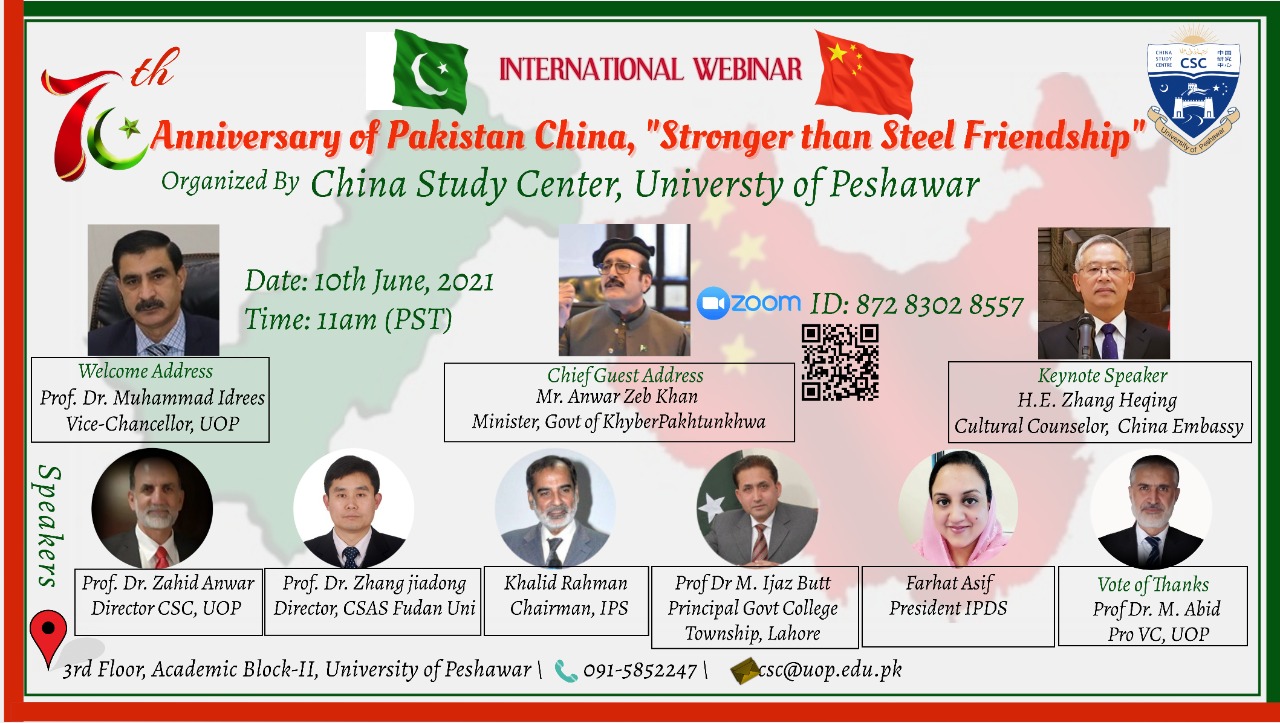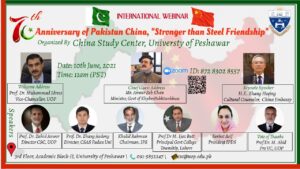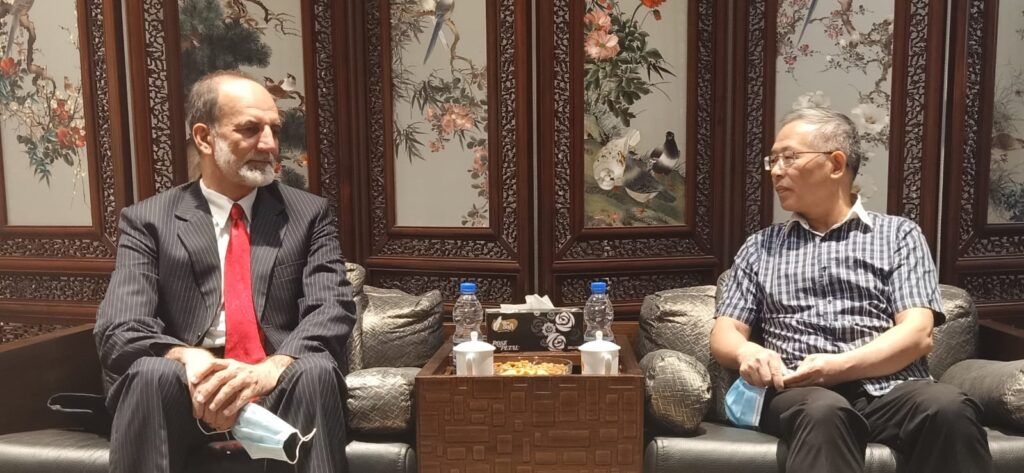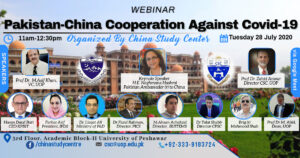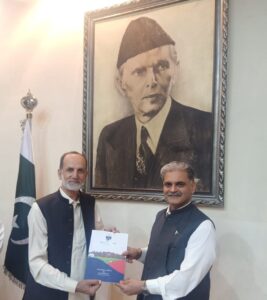INTRODUCTION
China Study Center, University of Peshawar, Khyber Pakhtunkhwa, Pakistan has organized a webinar on, 70th Anniversary of Pakistan & China’s “Stronger than Steel Friendship” on 10th June, 2021 at 11 am at the conference hall of the Center. A large number of experts, diplomats, journalists, scholars, faculty and students participated in the webinar. The Director of the Center explained the objectives of the webinar.
 Prof. Dr. Zahid Anwar, Director, China Study Center & Dean Faculty of Social Sciences, University of Peshawar:
Prof. Dr. Zahid Anwar, Director, China Study Center & Dean Faculty of Social Sciences, University of Peshawar:
Distinguished speakers and honorable participants welcome to this international webinar. We are particularly thankful to H.E. Anwar Zeb Khan, Minister, Government of Khyber Pakhtunkhwa, Pakistan, H. E. Zhang Heqing, Cultural Counselor, China Embassy Islamabad, Prof Dr Zhang Jiadong from Fudan University China, Prof Dr Muhammad Idrees, Vice Chancellor, University of Peshawar, Khalid Rehman Chairman Institute of Policy Studies, Islamabad, Prof Dr Muhammad Ijaz Butt, Principal Government College Township Lahore, Madam Farhat Asif, President Institute of Peace and Diplomatic studies Islamabad and last but not least, Prof Dr Mohammad Abid, Pro Vice Chancellor, University of Peshawar.
This event is organized to celebrate 70th anniversary of Pakistan and China diplomatic relations. The purpose of this webinar is to learn and to know about the contributions and sacrifices given by the two nations for strengthening their relations. Pakistan and China have many commonalities on global and regional issues and this webinar is an attempt to explore and strengthen collaboration and convergence on global and regional issues between Pakistan and China. The story of bilateral relations between China and Pakistan is interesting and enriching and today this webinar is a humble effort to contribute to the collective endeavors to transform this stronger than Steel relationship into a joint march towards a shared and prosperous future.
Pakistan and China cooperation in defense field is very solid and impressive, Pakistan and China cooperation in economic field was augmented by Karakoram Highway KKH, Belt and Road Initiative (BRI) and China Pakistan Economic Corridor (CPEC), Pakistan and China cooperation particularly in public health security and fight against Pandemic (COVID-19) is still paying dividend. This Cooperation has saved Pakistan from a catastrophe, as we all know that Pakistan`s eastern neighbor has faced huge difficulties to successfully cope with the pandemic of COVID-19. On the other hand, the robust cooperation between China and Pakistan helped Pakistan considerably to tackle this pandemic successfully. It is hoped that today the distinguished speakers in this webinar will not only tread the trodden paths of cooperation but will also explore new avenues of collaboration between the two friendly countries.
 Prof Dr Muhammad Idrees, Vice Chancellor, University of Peshawar:
Prof Dr Muhammad Idrees, Vice Chancellor, University of Peshawar:
H.E. Anwar Zeb khan, Minister, Government of Khyber Pakhtunkhwa, H. E. Zhang Heqing Cultural Counselor, China Embassy Pakistan, Prof Dr Muhammad Abid Pro Vice Chancellor, University of Peshawar, Prof Dr Zahid Anwar, Director China Study Center, University of Peshawar (and newly appointed Dean Faculty of Social Sciences), distinguished speakers, participants and honorable Chinese scholars, Assalmualikum!
On behalf of University of Peshawar, I would like to welcome you all to this international webinar on 70th anniversary of Pakistan-China friendship organized by China Study Center, University of Peshawar. This year marks the 70th anniversary of the establishment the diplomatic relations between Pakistan and China. Diplomatic relations between the two countries were established on 21st May 1951. The friendship between the two counties is grown from strength to strength and maintained upward trajectory from last seven decades. The leadership of both the countries is committed to taking this relationship forward. Pakistan-China relations often narrated as higher than mountains, deeper than oceans, and sweeter than honey. China and Pakistan ties have developed into outstanding model of relations. The all-weather strong relations are based on mutual trust, respect and good well. Both the countries have signed various agreements on economic, defense, diplomatic and strategic spheres. With every passing moment this mighty brotherhood becomes stronger. Pakistan and China relations are based on solid foundation. Pakistan-China cooperation increases with the passage of time in all fields including the knowledge industry. The collaboration in higher education has strengthened in the wake of Belt and Road Initiative and CPEC. CPEC is launched by the Chinese president in 2015, which is a mega project of BRI that further galvanized academic cooperation in the institutions of higher learning between the two countries. We all know that CPEC is the flagship project in which China is investing more than $ 62 billion in Pakistan and set to become high quality demonstration project that further accelerate economic integration and regional connectivity. Both the countries have given importance to diplomatic relations to increase people to people cooperation. China appreciates Pakistani’s efforts to expand Chinese language and Confucius institutions in Pakistan. Most recently at the outbreak of COVID-19 in China the President of Pakistan H. E. Dr Arif Alvi travelled all the way from Islamabad to Beijing in March last year to express solidarity with the people and government of China. Similarly, when the pandemic reached to Pakistan, China also assisted Pakistan generously and we are thankful to China for gifting us diagnostic kits, equipment’s and vaccine that have helped save lives of thousands of our people.
University of Peshawar is the oldest and most established university of Khyber Pakhtunkhwa and it is playing an important role in educating the youth not only of the province but the region at large as well. The establishment of China Study Center, at University of Peshawar with the financial support of the embassy of People’s Republic of China, Islamabad has boosted mutual understanding between the people of the two countries about culture, socio economic and political development. University of Peshawar has signed agreements with several Chinese universities, and we hope that with the passage of time collaboration between University of Peshawar and Chinese universities will further strengthen in higher education. Pakistan and China have enjoyed close and friendly relations since the establishment of diplomatic relations and over the years this relationship has blossomed in all-weather strategic cooperative partnership. Pakistan considers China one of its closest friend and partner. China also considers Pakistan its iron brother. I hope this webinar organized by China Study Center, University of Peshawar is a worth appreciation effort and I hope the cooperation between Pakistan and China will continue in future and both the countries will work for progress and development of their people. Thank you all. Long live Pakistan-China friendship.
 H.E. Anwar Zeb khan, Minster Government of Khyber Pakhtunkhwa, Pakistan: English translation.
H.E. Anwar Zeb khan, Minster Government of Khyber Pakhtunkhwa, Pakistan: English translation.
Hello and Ni Hao
Welcome to His Excellency (H. E.) Zhang Heqing, Cultural Counselor, China Embassy Islamabad, Prof. Dr. Muhammad Idrees, Vice Chancellor, University of Peshawar, I am thankful to Prof. Dr. Zahid Anwar, Director China Study, University of Peshawar for inviting me as a Chief Guest at the International Webinar on Pakistan and China 70 years of diplomatic relations. Pakistan’s relations with China are very friendly and both consider themselves as best friends. The friendship between Pakistan and China is deeper than Indian Ocean, sweeter than honey and higher than the Himalaya. Pakistan-China friendship played a key role in the peace and development of the region. Pakistan and China cooperate with each other on many global issues. Pakistan is very happy that its friend, China has become a global economic power and this success of China made Pakistani nation proud. For the economic growth both Pakistan and China are working together in many joint projects. In this regard Pakistan and China are working closely with several other countries under Belt and Road Initiative (BRI) which is very important for the economic integration and prosperity of the region.
The work on China-Pakistan Economic Corridor (CPEC) is going on smoothly, which is very important for Pakistan’s economic development. CPEC will provide development opportunities to the backward areas of Khyber Pakhtunkhwa province. Due to CPEC Khyber Pakhtunkhwa especially the erstwhile tribal areas which are now part of Khyber Pakhtunkhwa will economically develop. Rashakai Special Economic Zone and Mohmand Marble City will provide jobs opportunity to hundreds of thousands of people. China is also investing extensively in numerous infrastructure projects across Pakistan. The people and the government of Pakistan consider China as a great friend and over time this friendship will become stronger.
This relationship was built on the foundation of successive accomplishments and is getting stronger with each passing day and year. Every government in Pakistan tries to strengthen its relations with China and the current Government of Pakistan Tehreek-e- Insaf under the leadership of Prime Minister; Imran Khan gives special importance to Pakistan relations with China. The leadership of the two countries is committed to taking this relationship to new heights. I hope that today experts in this online conference will share their wisdom on different aspects of Pakistan and China Relations will be published and shared with the policy-makers to further strengthen this friendship in future. Long Live Pakistan-China Friendship
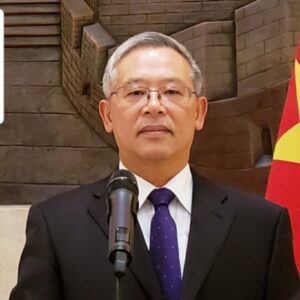 H.E. Zhang Heqing, Cultural Counselor, China Embassy Islamabad:
H.E. Zhang Heqing, Cultural Counselor, China Embassy Islamabad:
Respected Prof. Dr Muhammad Idrees Vice-Chancellor, University of Peshawar, honorable Minister Anwar Zeb khan, Government of Khyber Pakhtunkhwa, Prof. Dr Zahid Anwar, Director China Study Center, and Dean Faculty of Social Science, University of Peshawar, other distinguished speakers and Guests, ladies and gentlemen Assalam-o-Alaikum.
It is my great pleasure and honor to attend this significant international webinar on the 70th anniversary of Pakistan and China Stronger than Steel Friendship. On behalf of Chinese Embassy in Pakistan and His Excellency Nong Rong, Chinese Ambassador to Pakistan, I would like to thank University of Peshawar for the invitation to deliver a Keynote speech in this international webinar. I would take this opportunity to thank the University of Peshawar for its constructive efforts in promoting China Pakistan friendship in the field of education and culture. Also, I would like to thank China Study Center University of Peshawar for promoting this kind of exchanges and for holding other such events.
As everyone knows this year marks the 70th anniversary of diplomatic relations between China and Pakistan. Both sides have held various celebrations early this year. 70 years ago, on May 21st, 1951, the People’s Republic of China formally established diplomatic relations with the Islamic Republic of Pakistan. Thus opened a new chapter of bilateral relations between the two countries and Pakistan is the very first country in the Muslim world to recognize the new China.
Over 7 decades under the leadership of the two countries the friendly relationship between China and Pakistan has grown stronger and stronger and has become a rock-solid no matter how the International and domestic situations changed. China and Pakistan have always stood together supported each other and move forward hand in hand.
In April 2015 President Xi Jinping paid a historic visit to Pakistan. Both sides upgraded the bilateral relations to all weather strategic cooperative partnership, which is highly praised by the honorable Vice-Chancellor, University of Peshawar, Prof Dr Muhammad Idrees in his address by calling it higher than mountains, deeper than sea, sweeter than honey and stronger than Steel. Honorable Prime Minister of Pakistan Imran Khan highly values Pakistan-China relationship. He has paid three visits to China ever since he took office and held four meetings with President Xi Jinping. China and Pakistan always make each other the priority in developing their foreign relations. It has become across region, across party and across class consensus in Pakistan to maintain friendly relations with China.
China Pakistan relationship is not only valuable strategic assets of both sides but also an exemplary model of state-to-state relations with different social system, history and culture. As President XI Jinping put it, China Pakistan relationship should be a model of good neighborly friendship, a pillar to safeguard regional peace and stability and benchmark for International cooperation on Belt and Road Initiative.
Past 70 years’ experience has proved that China Pakistan relationship and cooperation is not only in the fundamental interest of the two countries but also conducive to regional and global peace, stability, and development. China and Pakistan are committed to building a more just democratic and reasonable multipolar International order. The two countries have similar position to maintain the authority of multilateral system, safeguard the fairness of international relations, maintain peace and strategic stability, promote the development of human civilization, and ensure that all countries enjoy equal development environment. Under the guidance of the greatest leaders of the two countries the friendly and pragmatic cooperation between China and Pakistan has made fruitful achievements in recent years. As the pilot project of the Belt and Road Initiative, CPEC has become important platform for all-round cooperation between the two countries. CPEC has expanded to key areas of Gawadar port, energy, transportation, infrastructure, agriculture, industry, science and technology, education and social livelihood and cover almost all aspects of Pakistan`s development. Meanwhile, the two countries have continuously deepened and expanded cooperation in the field of military, security, culture, education, tourism, youth, sports so on and so forth, which further enhanced the foundation of the bilateral relations.
70 years journey of China-Pakistan relations has withstood the challenges and difficulties encountered all the way along. Time has forged ironclad friendship. Pakistan is affectionately called as Iron brother in China. After the outbreak of COVID-19 since early last year the Chinese and Pakistani governments, armies and peoples have helped each other by every means. Pakistan donated medical equipment’s to China and President of Pakistan Dr Arif Alvi visited China to support China. China has also been helping Pakistan to fight the pandemic to the best of his capacity. In the face of this century pandemic, China and Pakistan hand in hand, shoulder by shoulder jointly fighting against COVID-19. This has beautifully illustrated the spirit that a friend in need is a friend indeed. Pakistan and China are true friends and good brothers sharing weal and woe, setting a good example of International Corporation addressing the pandemic.
This year 2021 has a special significance both for China and Pakistan. For China, this year marks the 100th anniversary of the founding of the Communist Party of China (CPC) for Pakistan is realizing new Pakistan vision which is called Naya Pakistan. The CPC has evolved from a small party to around 50 members to the largest ruling party with more than 91 million members.
The CPC has also led the Chinese people and a great force of rejuvenation of the Chinese nation on the progress of human civilization which has scored a great historical victory in fight against extreme poverty and lifted 770 million people out of poverty. China now is the world second largest economy. Last year China made its 14th 5-year plan for national economy and social development; under 15-year long term plan goes by the year 2035.
We highly appreciate Naya Pakistan vision, and we really appreciate experience and deepening exchanges with Pakistan on governance much with the development strategies and push forward to realize each of our vision. In the context of changes in the world in a century Chinese President Xi Jinping proposed the vision of building a community with a shared future for mankind educating to build a world lasting peace, common security, shared prosperity and inclusiveness and wellness.
This vision is China solution to the challenges and problems which is facing the world on the way to build a community of shared future for mankind. The significance of China-Pakistan relations is becoming more prominent. We are committed to working with Pakistan to effectively implement the consensus of the leaders of the two countries, carry forward the great traditions of China-Pakistan relations, deepen strategic, mutual trust and pragmatic cooperation and jointly work for high quality development of the CPEC. We are confident that our joint efforts will inject new impetus in China Pakistan friendship and make new demonstration to building a community with shared future for mankind.
China and Pakistan linked by mountains and rivers have been joined traditional common neighborhood relationship. The friendly exchanges between our peoples are far more than 70 years as early as 2000 years ago the ancient Silk Road has linked the exchanges and cooperation between the two countries. We sincerely hope that China Pakistan will continuously hold up the torch of friendship and carry forward forever overcoming the difficulties and challenges which may emerge and make concerted efforts to build China Pakistan community of shared future in the new era and jointly paint a more beautiful future for both Nations. To conclude I wish this webinar a complete success.
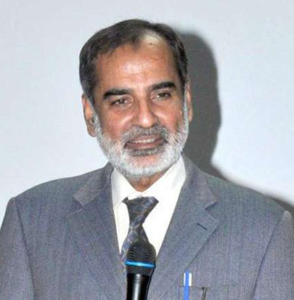 Mr. Khalid Rahman, Chairman Institute of Policy Studies (IPS): A Friend in Need is a Friend Indeed:
Mr. Khalid Rahman, Chairman Institute of Policy Studies (IPS): A Friend in Need is a Friend Indeed:
Thank you, Prof. Dr. Zahid Anwar, for providing me this opportunity to speak on this very important theme. I am honored to share that my interactions with Chinese friends, spread over around three decades have provided me a number of opportunities to discuss various issues that are beneficial to the two countries and their relationship. I have good memories of visiting Fudan University also and these were revived while listening to our good friend prof Dr Zhang Jiadong. I also recall my several visits to Peshawar University along with our Chinese friends who were IPS guests in Islamabad. These visits culminated in establishing a kind of relationship between Peshawar University and some of its departments with Chinese institutions, which I regard as an honor for me.
It was a pleasure to listen to the earlier speakers particularly Minister of Government of Khybar Pakhtunkhwa as well as the Honorable Vice Chancellor University of Peshawar and the guests form the Chinese Embassy specially H.E Zhang Heqing.
Let me begin by going back to 1951 and have a look at the context and the background in which the two countries established their diplomatic relationship. It was, as we all know May 21st, 1951, when Pakistan and China established diplomatic relations. I believe few people could have imagined that this, apparently, a customary move would lay the foundation for extraordinary bilateral ties which is today called, quite rightly, an exemplary bilateral relationship in the global affairs. The move was however significant for a number of reasons, but I would like to emphasize two factors: in the global context, it was a time when the world was divided into communist and anti-communist and Pakistan was one of the first non-communist countries to establish the diplomatic ties with the People`s Republic of China; in the regional context, it was a time when the foundation of friendship between India and China was laid. The significance of relations, with this background in view, is quite obvious.
What followed was the frequent contacts and increasing trust between the successive leaders of the two countries. Importantly the process continued in spite of fast changing regional and global situations. Moreover, the relations were not limited to customary diplomatic affairs. Despite following different governance systems, the affinity and trust between the two countries only became deeper and deeper.
Today we can say without any doubt that apart from benefiting the two sides this deep-rooted relationship has also helped, maintain regional balance and as a consequence regional peace and stability.
Meanwhile, as we all know China has made extra ordinary progress, especially during the past four decades. Today the Chinese economy is the biggest in the world in terms of purchasing power parity. The country is now a hub of manufacturing and services, and set to become a financial hub sooner rather than later. With this development and progress, China can rightfully be regarded as the growth engine of the world. On the domestic front, China is moving towards striking the right balance in regional development, and has lifted more than 700 million people out of absolute poverty.
On the other hand, China today not only symbolizes fast and inclusive economic growth, but it also plays a vital role in international relations and setting trends in global affairs. I hope I will not be exaggerating, if I say that, most Pakistanis look at China’s growth with hope and pride. We realize as Pakistanis that our growth is suffered significantly due to several internal and external factors. Consequently, we also recognize that the equation between our two countries has also changed to an extent. Yet, the beauty of relationship is that it hasn’t altered the spirit of mutual respect and cooperation. And, let me stress that it is this spirit of mutual respect and trust that brings hope and pride for Pakistanis in this relationship.
An important indicator in this regard in my view is CPEC. We know that CPEC is apparently a bilateral project, yet the special significance of the CPEC is that it serves as the backbone as well as a flagship project of BRI. We also know that BRI is a huge initiative. It is an initiative, which aims to improve regional connectivity and infrastructure. It is something that has the potential of transforming the global economic and political landscape. So, it is natural to be proud that Pakistan is playing a special role in making BRI a success.
Let me also emphasize that the history of connectivity between Pakistan and China goes back thousands of years, but even in recent history, the CPEC is not the first step to improve connectivity between the two sides. The foundation of this connectivity, in recent history was laid much earlier. You may recall that an air corridor was established with the first Pakistan International Airlines flight started way back in 1964. This air corridor was followed by land corridor with Karakorum highway in 1978. Later we saw the initiation of sea corridor by building the Gwadar port, which created new shipping and logistic opportunities for the two sides at the beginning of this century. More recently, the laying down of fiber optic has added the cyber dimension to this already established air, land and sea linkages. I would say it is these linkages that laid the foundation for today’s Mega projects.
I would also like to highlight here that CPEC was agreed upon in 2013 and was formally launched in 2015. Until now only the first phase of this mega project has been completed. Nevertheless, Pakistan is already enjoying its benefits. Projects worth $ 25 billion out of a total of $ 65 billion have already been added to Pakistan’s infrastructure and economy. We also see, the completion of several energy projects has largely reduced the power shortage in Pakistan. Similarly, I feel, the construction of several highways have made transportation easier.
Another highlight is that the operations at the Gwadar Port have started, and the foundations of at least three economic zones have been laid. Also, according to official data I would say 70,000 to 80,000 new jobs have been created, whereas people-to-people contact is on the rise which was one of the deficit areas in our bilateral relations.
Let me add here, another significant feature of Sino-Pakistan relations that it covers nearly all the important aspects of life. I feel the economic aspect has been in the spotlight due to CPEC, which is understandable in the given context, the cooperation between the two countries in political, strategic and security related affairs is also on the same trajectory. When it comes to endorsing each other, in matters related to their respective core interests, both sides have supported each other. Similarly, cooperation in the technological, academic and cultural fields has also been increasing. And probably one of the most important hallmarks of the relationship and which, in my view is a constant, is the enhancement of each other’s potential, particularly in high-tech and defense.
Before I conclude, I would like to highlight another important dimension of the solidly founded relationship, which many of us either ignore or avoid discussing. I think, given the diversity in their societies and cultures, and of course in their governance system, it is not correct to assume the two countries never have any differences. They do, but their mutual trust and respect do not allow these differences to turn into disputes or a matter of public debate. Summing up I would say, while relations have given Islamabad a sense of security, stability and solidarity, Beijing has found a true friend in Islamabad that has unwaveringly stood by it and done all it could do to help boost China’s role in global affairs.
The China-Pakistan relationship is based on shared ethos and instilled with humanity, modesty and sharing. There is no doubt that apart from cooperation and harmony, values have also played a major role in this success. The principle of mutual respect practiced by the two sides can ensure durable peace, prosperity and development among countries if they continue to adhere in the true spirit. And my last point is related to hybrid war which is so common these days. The current exemplary relationship is an outcome of the contributions of three to four generations of leadership and people in the two countries; it is time in this age of increasing globalization and hybrid war that the spirit of mutual respect and mutual trust, which is one of the targets of our adversaries in the global and regional arena, is genuinely transferred to the new generations of the two countries.
 Prof. ZHANG Jiadong, Director of Center for South Asian Studies, Fudan University.
Prof. ZHANG Jiadong, Director of Center for South Asian Studies, Fudan University.
To Build a Deeper and Solider China-Pakistan Relationship:
Hello everyone, I am Zhang Jiadong from the Center for South Asian Studies, Fudan University. First of all, I am very grateful to Vice chancellor Prof Idrees of University of Peshawar, for this conference’s happening, and to Prof. Zahid Anwar, Director of China Study Center, for the invitation to give me this opportunity to participate in this important conference. Secondly, I am also very grateful for the wonderful speeches of the previous speakers, which allowed me to learn a lot. As we know, the world is undergoing a grand change. China-Pakistan relations also have the necessity and opportunity for adjustment and development.
Generally, the relationship between countries is based on national interests, power, and security needs, whether cooperation, competition or conflict depends on the countries’ perception on what they need. The relationship between friendly countries is based on the relationship of interest, coupled with the psychological bond. This is the traditional China-Pakistan relationship. At present, China-Pakistan relations, under the impetus of a series of major initiatives and projects such as the China-Pakistan Economic Corridor, are moving towards a new height of a China-Pakistan Community with a Shared Future. Therefore, the China-Pakistan relationship is unique, with three levels of connotation:
The first is the sharing of national interest. Pursuing the maximization of self-interest is the common mission of all sovereign countries. China and Pakistan are no exception. Since the establishment of diplomatic relations between China and Pakistan, especially since the 1960s, China and Pakistan have established close bilateral relations based on their own national interests and national security needs. In 2020, the bilateral trade volume between China and Pakistan is 17.49 billion U.S. dollars, although it has decreased compared with previous years. However, compared with the generally declining trade volume during the pandemic, the performance of bilateral trade between China and Pakistan is not bad.
The second is psychological bond. The Chinese call Pakistan as the Pakistani Iron-brother (巴铁), and the Pakistanis also regard the Chinese as their all-weather friends. Even when I visited the US, I could still feel the friendship of a Pakistani taxi driver towards Chinese people. The relationship between the local governments of China and Pakistan has also become closer. At present, 16 pairs of sister cities have been established between the two countries. Shanghai, where Fudan University is located, established sister city relations with Karachi as early as 1984. Both cities have conducted pragmatic and effective exchanges and cooperation in areas such as urban planning and garbage disposal.
The third is the commonality of future. Since President Xi Jinping put forward the concept of a Community with a Shared Future for Mankind, China’s diplomacy has taken a new direction. The world is huge, and we must start from the surrounding countries. In an increasingly complex and volatile international environment, a closer Sino-Pakistani relationship will become even more important to both countries.
China Pakistan relationship is a form of relationship that does not seem to have a strong alliance system, but is more sustainable and more advanced than the alliance. The friendship between China and Pakistan did not start with the armed conflict on the Sino-Indian border in 1962. In 1961, Pakistan voted for the People’s Republic of China in the United Nations General Assembly. China-Pakistan relations have embarked on a track of sustainable, stable and reliable development. It can be said that for the two countries, the China-Pakistan relationship is the most stable pair of bilateral relations.
The alliance system since World War II is often based on national interests, values, and cultural traditions. It still belongs to the category of traditional diplomacy. Once the direction of national interests is adjusted and the political system changes, the alliance system may change. Comparing to this, China-Pakistan relations are based on national interests, but they are higher than national interests. They have a solid foundation of public opinion and people to people bonds, so they are more sustainable than alliance relations. China-Pakistan relations also transcend the traditional political system and religious and cultural boundaries, so they are more advanced than the alliance system.
To further advance China-Pakistan relations and make them a model of bilateral relations that are different from alliance relations, China and Pakistan still have a lot of work to do. First, it is necessary to further strengthen bilateral economic and trade relations. Both countries should have a closer cooperation in trade and in the division and cooperation of labor along the industrial chain. At present, it is more important to further implement the relevant projects of the China-Pakistan Economic Corridor, and push the infrastructure cooperation stage of CEPC to industrial cooperation stage, so that CPEC can produce more economic interest and be more sustainable, and benefit more enterprises and people of the two countries.
The second is to further strengthen the humanities relationship between China and Pakistan. At present, there are still some factors that hinder people-to-people and cultural exchanges in China and Pakistan, and the two countries should work hard to avoid these interferences. A good bilateral relationship must be built on the basis of people to people exchanges. In addition, China and Pakistan should also strengthen cooperation in media communication to create a better environment for a good humanistic relationship.
The third is to strengthen the cooperation in the financial and investment fields. China and Pakistan have signed several financial and investment cooperation agreements. Some of them have already been implemented. But in this area, the two countries still have great potential for cooperation. A closer financial and currency relationship will make a qualitative leap in China-Pakistan economic and trade relations.
Fourth, China and Pakistan should further strengthen the engagement, exchanges and cooperation between relevant government departments at the work level. China and Pakistan have common interests in many areas, but there will also be inconsistent steps in some areas. This requires the direct connection and coordination between the working levels of two governments, turning the friendly relations into working-level coordination, cooperation and even joint actions.
Shortly, I think that China and Pakistan should continue to maintain a low-profile, pragmatic and stable strategic partnership. It is necessary to strengthen practical and effective cooperation among the economic and trade, investment, finance, humanities, communication, and government work levels, without having to pursue upgrade of strategic and political relations. This relationship can not only provide both sides with a stable and sustainable strategic expectation, but also provide sufficient space and flexibility for the two countries’ foreign policies. This will benefit bilateral relationship eventually.
 Prof Dr Ijaz Butt, Principal Government College Township, Lahore
Prof Dr Ijaz Butt, Principal Government College Township, Lahore
Prof Dr Mohammed Idrees, Vice Chancellor, University of Peshawar, Mr. Anwar Zeb Khan Minister, Government of Khyber Pakhtunkhwa and H. E. Consul General China Embassy Islamabad, honorable guests, my presentation is on, Pakistan China border settlement a major CBM in their relations.
Pakistan shares a common border with the People’s Republic of China, almost 600 km long and that border had never been properly defined in history even during the British India. It had never been defined properly and was a customary border. As far as India-China relations are concerned, the border dispute resulted into a major war between the two countries in 1962, which made the two giants hostile to each other.
Pakistan and China friendship is exemplary, its higher than Himalayas, deeper than the Pacific Ocean, I firmly believe if there would have been any misunderstanding, miscalculation between the two countries on this issue of border settlement the subsequent events in their relations might have not been the same. General N. A. M. Raza, Pakistan Ambassador to China played an important role in taking the initiative to discuss and settle the border dispute between the two countries.
Pakistan and China started negotiations and at that time Pakistan foreign minister was Mr. Manzoor Qadir who also made a visit to China to discuss border settlement. When it became open that Pakistan is negotiating its border settlement with China, India started propaganda against Pakistan. But the fact is that this negotiation process was done and ultimately an agreement and settlement was done between the two countries and the proper agreement was signed on 2nd March 1963. At that time Pakistan foreign minister was Mr. Z.A Bhutto.
China virtually ceded 750 square Miles of territory to Pakistan in the surrounding Hunza valley which was virtually in Chinese control, and its troops were patrolling right from the day when Pakistan came into being. China relinquished its claim on Hunza valley, K2 peak and also relinquished its claim on all the areas in the surrounding of Hunza valley as a goodwill gesture. It is mere Indian propaganda that Pakistan ceded territory of Kashmir to India. Pakistan has given a vital support to China during its war with India in 1962. China recognized this good gesture of Pakistan during this bloody war and subsequently they were very accommodative towards Pakistan on this issue of border settlement.
I believe that this was a milestone in their relations because both countries have shown flexibility, goodwill towards each other and settled this issue amicably, which is the world’s most difficult border, which was virtually demarcated by applying all the latest techniques which were available at that time. All Ariel support was taken by the surveyor General of Pakistan and all modern equipment were used to demarcate the border. So, after this border settlement which we believe China signed with Pakistan accommodating Pakistani concern ceding territory which was in its actual control. That was the development which subsequently laid the foundation of exemplary friendship between the two countries because after the 1963 border settlement between the two countries, their ties strengthened day by day and it touched a new height in 1965 when China openly and fully supported Pakistan in its war with India.
I believe that this border settlement was the real CBM in their relationship. If China would have not showen this sort of goodwill gesture and would have not shown this flexibility, if Pakistan would have not shown its goodwill gesture during the border settlement negotiations, the relations might have not been so friendly. It was indeed a very significant development in their relations that they demarcated their 600 km long border with the satisfaction of both the countries. Leadership on both sides played vital role in the amicable solution of the border issue. Chinese leadership especially Chairman Mao Zedong, Premier Zhou Enlai, and Pakistani leadership particularly President Ayub Khan, Manzoor Qadir, N. A. M. Raza paved the way for a very cordial relationship in the years to come.
 Farhat Asif, President Institute of Peace and Diplomatic Studis (IPDS):
Farhat Asif, President Institute of Peace and Diplomatic Studis (IPDS):
Thank you so much Prof Dr Zahid Anwar for hosting this important forum on how over the past seven decades we were able to build this strong like steel relationship which has faced a lot of challenges but at the same time grow stronger as a result. I am so honored to share the stage with Mr. Khalid Rehman, Culture Counselor of China, Prof Dr Muhammad Idress, Vice-Chancellor, University of Peshawar and Minister Mr Anwar Zeb khan, Government of Khybar Pakhtunkhwa. We were discussing over the past hour that how the relations have been built over the time period and many aspects have been discussed so far, I would like to discuss about the significance of the relation which has been missing during the course of this discussion. How were the people to people ties over the past 70 years? This is not just one day, one year, it has been done for the past seven decades. While being a student of Chinese foreign policy, public diplomacy practitioner for the past 15 years at Institute of peace and diplomatic studies, we have been conducting research and publications and a lot of efforts had been made so far in order to build the relationship on people to people ties between Pakistan and China. On June 3rd and earlier we have signed an MOU with Public Diplomacy Centre in Uzbekistan of Shanghai cooperation organization and Prof. Dr Zahid Anwar were there yesterday we have been hosting the conversation how we can build the relationship between Uzbekistan and Pakistan with SCO. And then on June 3rd we fortunate enough to have signed the MOU and agreement of cooperation and partnership from Pakistan with one of the commissions based in Ministry of Foreign Affairs of China on how people to people ties can be developed with good neighborliness. On June 3rd this important initiative has been done by the leaders. The event was held in Wuhan and I would really like to share that important Wuhan initiative that has been outlined and shared widely, is about how people to people ties are so significant between the two countries and as we are discussing about Pakistan and China these are so significant for building the ties between both countries. Over the years we have seen it is not just when the CPEC happen. It is the instruction of the relationship that we have seen people travel from Pakistan to China we have always saw China as a land of knowledge, but we can travel and seek knowledge of course, guided by our Prophet Muhammad (PBUH) who said seek knowledge even if you have to travel as far as to China.
When we see that over the past many years, we can see collaboration among universities we have seen collaboration among the institutions and quite recently after the emergence of CPEC contribution towards and the socio-economic, industrial, agriculture cooperation has been happening. The cooperation is deep rooted that is not just limited to scholars` level, but to agricultural, industrials, entrepreneur, youth, and students’ levels as well. Taking the opportunity, I would like to encourage the students to think deeper about how China has been able to revolutionize and fight the poverty, how China had been able to revolutionize the economic base of the country`s system.
Taking the opportunity, I would like to congratulate on 1st July 100th anniversary of Communist Party of China, (CPC). we can see that how a political party (CPC) has given political base, structure, and stability to a country and how it has given the stability and how the people centric approach of a country has given the dividend. Economically the country has developed and has become one of the world largest and fastest growing economies. And how the country has strategically put forward the planes on regular basis and how the five years planes and has been implemented? How the milestones and goals have been set by the country and when we look at those studies and specially I would like to encourage all the students who are sitting around here with us in this forum to study about that, it’s significant for us to understand especially when we at home are facing so many challenges.
Similarly, I encourage the young scholars also to join the WeChat, which is a significant learning and a communication platform of China. So if you are a researcher and want to understand Chinese foreign policy, and want to understand about people living there you better join those digital platforms. Thank you so much Prof Dr Zahid Anwar for providing me the opportunity and I would like to encourage young scholars to study and research and seek knowledge and learn from Chinese experiences. If we look at the history, almost 50 years ago the country has been facing a lot of challenges but now it is a technologically advanced country, it is an economic titan, it has launched Belt and Road Initiative and off course sharing the dividend with the region around. Thank you so much for providing the opportunity and I hope that this forum will continue contributing towards building the partnership between both Pakistan and China.
 Prof Dr Muhammad Abid Pro Vice Chancellor, University of Peshawar, Vote of Thanks:
Prof Dr Muhammad Abid Pro Vice Chancellor, University of Peshawar, Vote of Thanks:
Assalam-u-Alaikum and Ni Hao.
Prof Dr Zahid Anwar thank you very much for organizing such a wonderful webinar to remind us and our research students about the seventy years of friendship between China and Pakistan and I am very thankful to all the speakers Prof Dr Muhammad Idrees, Vice Chancellor, University of Peshawar, Mr. Anwar Zeb khan, Minister of Government of Khyber Pukhtunkhwa, H.E Zhang Heqing ,cultural Counselor, China embassy, Prof Zhang Jiadong from Fudan university China, Mr Khalid Rahman, Chairman, IPS Islamabad, Prof Dr Ijaz Butt, Government collage township, Lahore Pakistan, and Madam Farhat Asif for delivering their valuable speeches. Of course, I don’t intend to repeat whatever the experts have already said. As far as my personal experience is concerned from very childhood we are listening and hearing about Pakistan China friendship. When I was in school, I used to listen radio Peking, Urdu service at that time. Later on, when I was in Britain for my Ph.D. degree. So the western students and my fellow students’ used to call China a sleeping giant because at that time the Soviet Union and the United States were two big powers of course they were thinking when the sleeping giant will awake, it will shake the world, so what I remember, when I was abroad, I saw Chinese friends, so they were very warm, and we used to exchange views of friendship. When I visited China, our Chinese friends called us iron brothers. All these things indicate that in these seventy years our relationship has transformed into stronger than steel as the topic of this webinar has very rightly depicted. When I visited China for the first time in 1993, I wrote a travel book in Urdu as well and when I visited China again in 2017, 2018, I found a very big difference between China of 1993 and China of 2017 and 2018. We are happy when we see our friend, China has become prosperous. My own field of specialization is artificial intelligence, computer science and normally I tell my students that China has planned to be a leader in artificial intelligence by 2030 and in our field of specialization there are many opportunities of joint research. Ladies and gentlemen and all the participants from China and from Pakistan thank you for sparing time and joining this webinar on 70th anniversary of Pakistan-China`s “Stronger than Steel Friendship”

